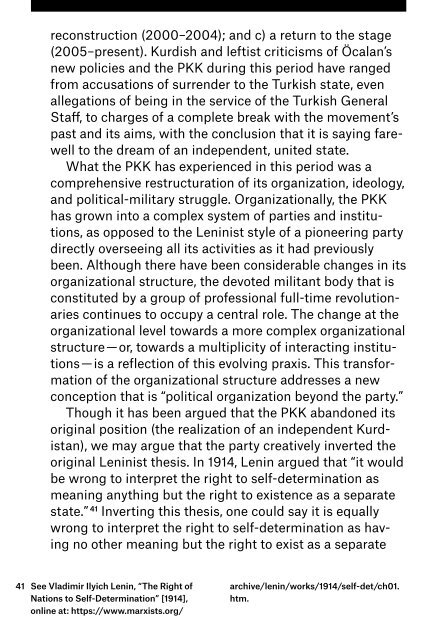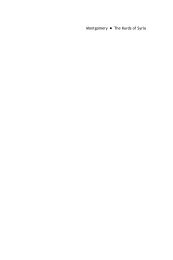Stateless Democracy
1RHiH4Y
1RHiH4Y
Create successful ePaper yourself
Turn your PDF publications into a flip-book with our unique Google optimized e-Paper software.
econstruction (2000–2004); and c) a return to the stage<br />
(2005–present). Kurdish and leftist criticisms of Öcalan’s<br />
new policies and the PKK during this period have ranged<br />
from accusations of surrender to the Turkish state, even<br />
allegations of being in the service of the Turkish General<br />
Staff, to charges of a complete break with the movement’s<br />
past and its aims, with the conclusion that it is saying farewell<br />
to the dream of an independent, united state.<br />
What the PKK has experienced in this period was a<br />
comprehensive restructuration of its organization, ideology,<br />
and political-military struggle. Organizationally, the PKK<br />
has grown into a complex system of parties and institutions,<br />
as opposed to the Leninist style of a pioneering party<br />
directly overseeing all its activities as it had previously<br />
been. Although there have been considerable changes in its<br />
organizational structure, the devoted militant body that is<br />
constituted by a group of professional full-time revolutionaries<br />
continues to occupy a central role. The change at the<br />
organizational level towards a more complex organizational<br />
structure — or, towards a multiplicity of interacting institutions<br />
— is a reflection of this evolving praxis. This transformation<br />
of the organizational structure addresses a new<br />
conception that is “political organization beyond the party.”<br />
Though it has been argued that the PKK abandoned its<br />
original position (the realization of an independent Kurdistan),<br />
we may argue that the party creatively inverted the<br />
original Leninist thesis. In 1914, Lenin argued that “it would<br />
be wrong to interpret the right to self-determination as<br />
meaning anything but the right to existence as a separate<br />
state.” 41 Inverting this thesis, one could say it is equally<br />
wrong to interpret the right to self-determination as having<br />
no other meaning but the right to exist as a separate<br />
41 See Vladimir Ilyich Lenin, “The Right of<br />
Nations to Self-Determination” [1914],<br />
online at: https://www.marxists.org/<br />
archive/lenin/works/1914/self-det/ch01.<br />
htm.<br />
state. According to Mustafa Karasu, a leading PKK veteran,<br />
socialists should not fixate so much on the state as its<br />
political project. The concept of the nation-state, he argues,<br />
is not a socialist, but a bourgeois concept. The PKK’s<br />
project of radical democracy, and in particular the idea<br />
of democratic confederalism — developing a bottom-up<br />
democratic system beyond existing borders — aims to render<br />
borders flexible, and in the long-term, irrelevant. As a<br />
matter of fact, through its political projects of establishing<br />
a democratic republic, democratic autonomy, and democratic<br />
confederalism, the PKK is drawing a new agenda for<br />
self-determination, while simultaneously going beyond the<br />
concept of the nation-state.<br />
More crucially, during this period the PKK managed to assemble<br />
Kurdish identity demands into a project of radical democracy.<br />
This was achieved through the elaboration of new<br />
ideological and political approaches, which created opportunities<br />
for the PKK to enlarge its scope of interest and activities,<br />
thereby creating more space for a Kurdish public sphere.<br />
In aiming at the transformation of society in all aspects rather<br />
than capturing state power through armed struggle, PKK efforts<br />
now allow for a broader field of operation.<br />
The political-military struggle, meanwhile, has shifted<br />
more and more in the direction of a political struggle, in<br />
which the DTP (and afterwards the BDP), with its grassroots<br />
organization and nationally and locally elected representatives,<br />
and the DTK have begun to take the lead. Especially<br />
after the elections of 2007, 2009, and 2011, a more powerful<br />
Kurdish public sphere emerged. A prominent Turkish<br />
columnist wrote as early as 2004: “After the painful period<br />
which Turkey experienced in the last quarter of the twentieth<br />
century, a separate state could not be established on its<br />
soil, but a separate political geography has been formed in<br />
its Southeast.” 42 Though he could not have been more right,<br />
perhaps he did not foresee its concrete manifestation.<br />
184–185



